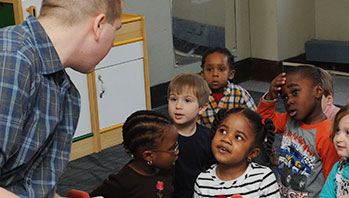- plastic container with lid
- pebbles
- container of water
- boat
- float
- sink
MA Standards:
Speaking and Listening/SL.PK.MA.1: Participate in collaborative conversations with diverse partners during daily routines and play.
Language/L.PK.MA.6: Use words and phrases acquired through conversations, listening to books read aloud, activities, and play.
Head Start Outcomes:
Language Development/Receptive Language: Attends to language during conversations, songs, stories, or other learning experiences.
Language Development/Expressive Language: Uses language to express ideas and needs.
Logic and Reasoning/Reasoning and Problem Solving: Classifies, compares, and contrasts objects, events, and experiences.
PreK Learning Guidelines:
English Language Arts/Language 2: Participate actively in discussions, listen to the ideas of others, and ask and answer relevant questions.
Talk Together: Sink It!

© Commonwealth of Massachusetts, Department of Early Education and Care (Jennifer Waddell photographer). All rights reserved.
STEM Key Concepts: Objects behave differently in water; Some things float; Some things sink; If you add enough weight to a floating object, it will sometimes sink; Solids have physical characteristics that can be observed and described
ELA Focus Skills: Cause and Effect, Compare and Contrast, Follow Directions, Listening and Speaking, Predicting, Vocabulary
Educator Prep: Before the activity, puncture some of the bottles and containers with a few holes so the water will leak out.
Revisit the boats activity with the sticky notes. Have children recall what the numbers mean (how many pennies it took to sink the boat). Say, We explored how a boat can only hold a certain amount of weight (pennies) and still float. We also read about a boat that sank because it had too much weight on it in Who Sank the Boat?
- Hold up a plastic container with a lid and ask, What do you think might happen if you filled this container with pebbles? What if you filled it with water? Do you think it would sink? Why do you think that?
Social Emotional Tip: Discussing future plans helps children build the skills to organize and participate in independent activities.
